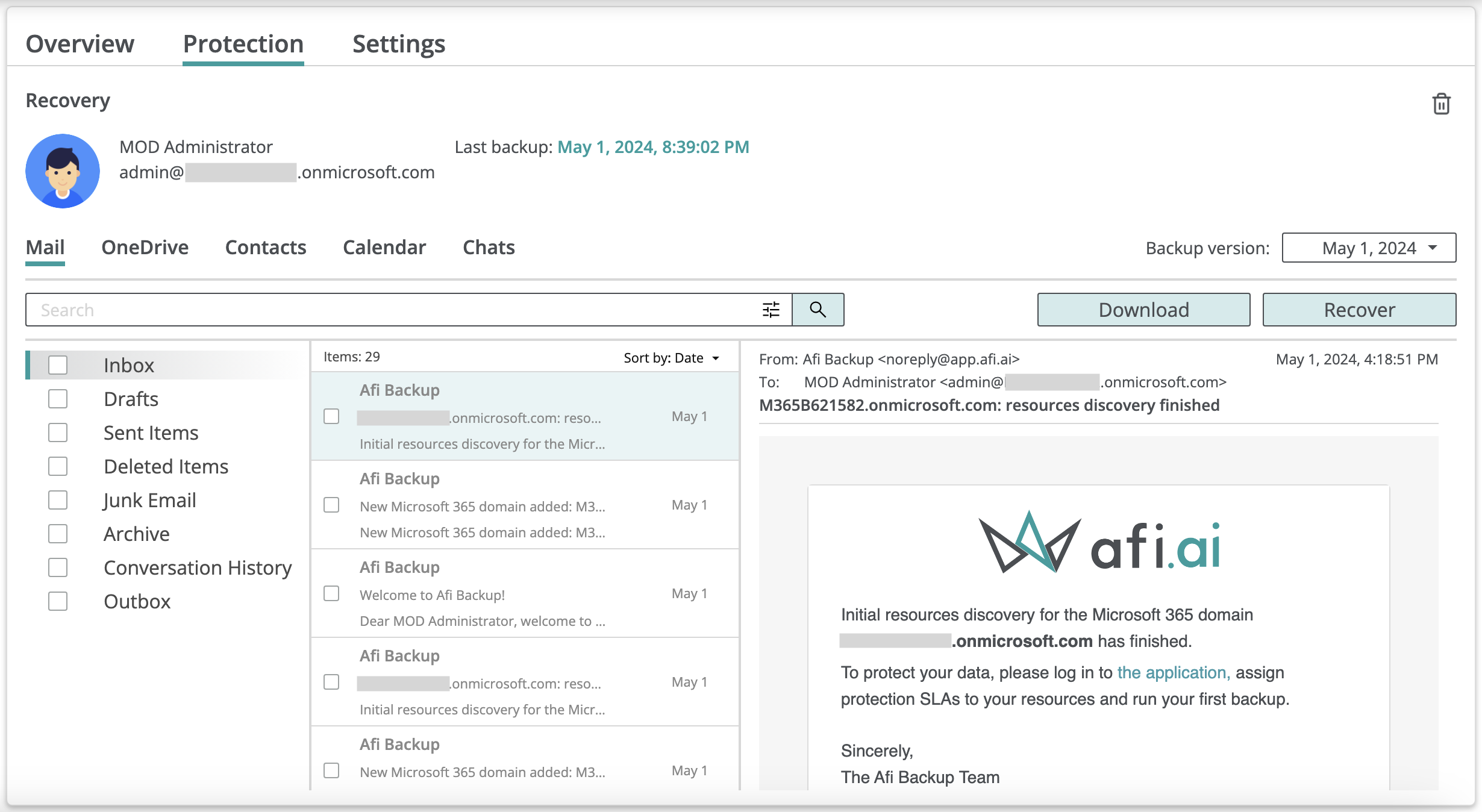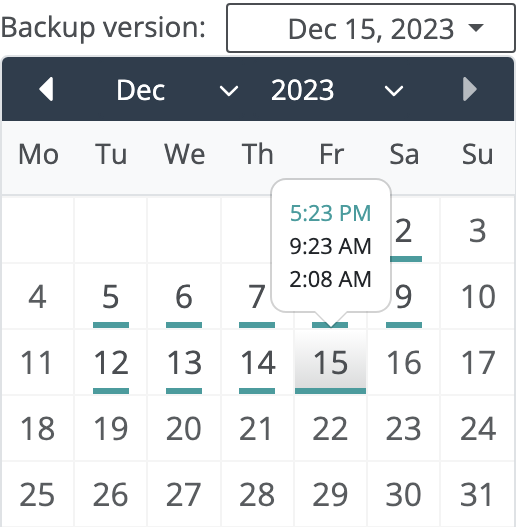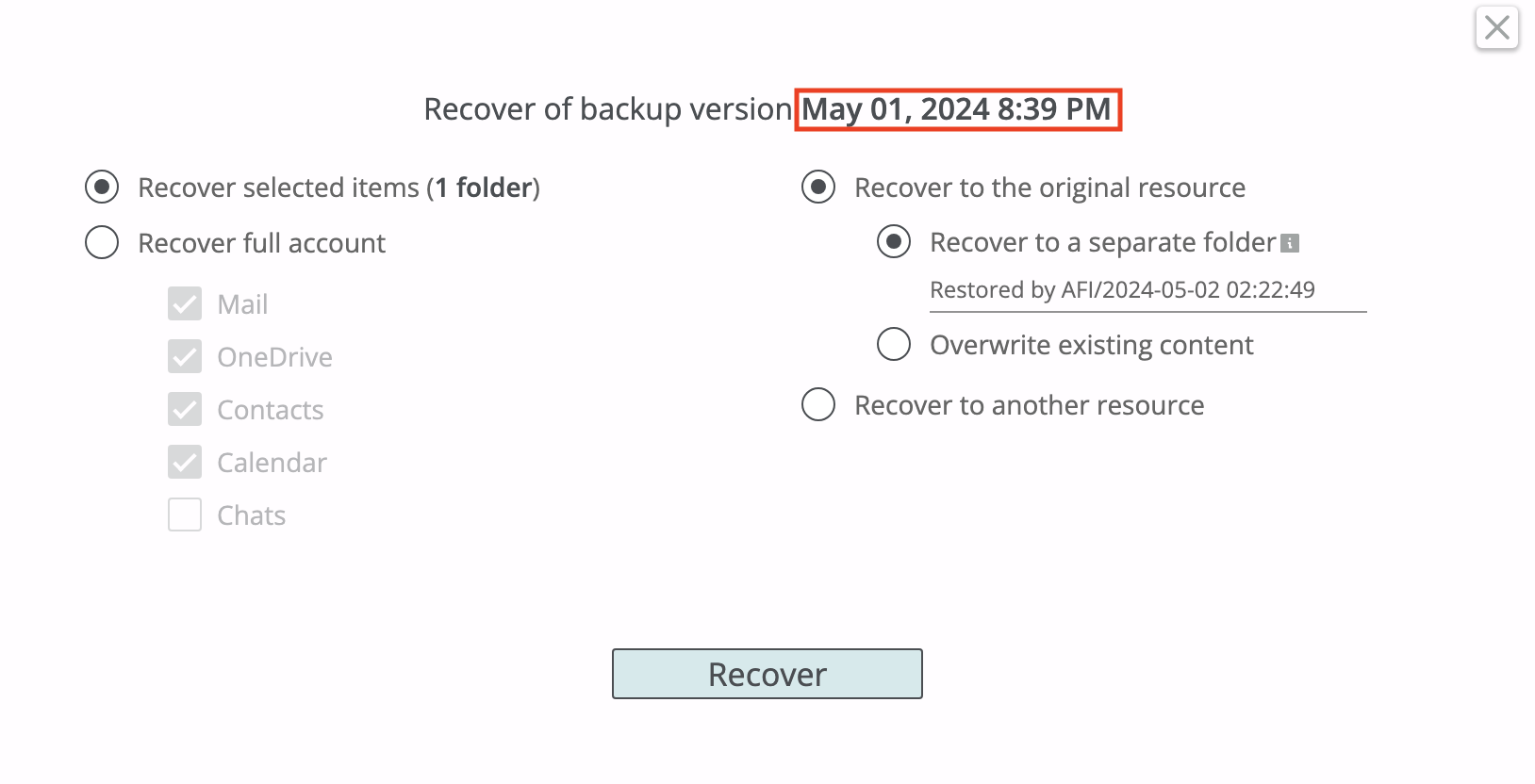Overview¶
Afi backup for Microsoft 365 provides comprehensive support for the Microsoft 365 ecosystem, including Exchange (Mail, Contacts, Calendar, Tasks), OneDrive and SharePoint, Groups and Teams, Entra ID (Azure Active Directory), and Power Platform. This article provides a detailed description of data backup and recovery scenarios for these workloads with Afi.
The current guide assumes that you have already installed the Afi application for your Microsoft 365 tenant, added it to the Afi portal and protected the resources with Afi. If not, please follow this article to set up your Microsoft 365 tenant in Afi.
How Microsoft 365 backup and recovery work¶
Afi uses the publicly available Microsoft 365 APIs to discover resources, synchronize data, and perform recovery activities. During tenant onboarding, you should consent to the Afi application to allow it to access your Microsoft 365 tenant.
For all Microsoft 365 workloads except Power Platform, Afi relies on Microsoft 365 application permissions and accesses data directly on behalf of the application, rather than impersonating a certain user. As a result, the Afi application installation is not tied to any particular Microsoft 365 user account and continues to function regardless of administrator changes within the tenant.
Afi relies on unique Microsoft 365 identifiers to recognize and access Microsoft 365 tenants and resources (user and shared mailboxes, sites, groups, teams, etc.). This approach makes email renames or domain name changes on the Microsoft 365 side transparent to Afi and ensures these changes do not affect its service activities. Such changes are automatically reflected on the Afi side within 24 hours, after a periodic resource synchronization with Microsoft 365. During this time, all backup and recovery activities continue running without interruption.
How to view backup data and navigate across backup snapshots¶
To view backup data for a resource (user/shared/room mailbox, SharePoint site, group/team, Entra ID, Power Platform), please go to the Service → Protection tab, locate the backup by searching for its name and click on the Recover button to open the backup browse view. Please note that clicking on Recover on the Protection tab doesn't trigger any actual data recovery activities.
When you open a backup, you will see a set of tabs corresponding to the workloads included in this backup:
Workloads per resource kind¶
The table below lists workloads available for a resource based on its kind. Please note that a backup might contain only a set of workloads corresponding to its kind if it is protected with a backup SLA policy that excludes specific workloads or if some workloads are disabled for this resource on the Microsoft 365 side (for example, if a user doesn't have an active SharePoint license and a provisioned OneDrive on the Microsoft 365 side).
| Resource kind | Available workloads |
|---|---|
| User mailbox | Mail - primary and archive mailboxes, Recoverable Items folders can be included optionally on the Service → Settings → SLA tab Contacts Calendar Tasks OneDrive Chats |
| Shared/room mailbox | Mail - primary and archive mailboxes, Recoverable Items folders can be included optionally on the Service → Settings → SLA tab Contacts Calendar Tasks OneDrive - only for mailboxes converted from a user mailbox with existing OneDrive backup Chats |
| SharePoint site | Site |
| Group/Team | Site Group Mail Team Channels Planner |
| Entra ID | Users Groups Roles Security Audit Applications Devices Administrative Units |
| Power Platform | Power BI Power Apps Power Automate Admin settings |
By default, the most recent backup snapshot is opened for browsing. You can switch between snapshots inside a backup using the calendar control. Each backup snapshot corresponds to the state of a resource during the period when the corresponding backup was made. If any item (such as an email or file) has been deleted, it will not appear in backup snapshots made after its deletion, but it will still be accessible in older snapshots. Similarly, if a file has been modified several times, different snapshots will contain different versions of this file.
Backup snapshots¶
To switch to a different backup snapshot, click on the Backup version dropdown and select a backup date by clicking on the corresponding day. If several backups were performed on that day, the service will display their start times, and you will need to click on the backup time to proceed to the snapshot.
After a backup snapshot is opened, you will be able to view user/drive state at the time of this backup snapshot and launch a data export or restore from this backup snapshot. The service will highlight a backup version from which an export or a restore is performed in the download or recovery settings dialogs.
By default, Afi preserves all backup snapshots and all item versions in the corresponding backup snapshots indefinitely. If you want to limit how long the Afi service keeps backup snapshots or files/emails inside backups, you can configure custom retention settings for your backup SLA policies as described here.
Afi backups are forever incremental which means that after an initial full data synchronization the service will synchronize only the following items that were added or changed since the previous backup. Because of this, the service synchronizes a relatively small amount of data during each incremental backup, making incremental backups fast and lightweight in terms of data added to a backup.
Search¶
Afi allows you to search across all workloads inside a backup and offers comprehensive search capabilities, including full-text search for email data, search across file/folder names for drive data, metadata fields search, as well as various filters to refine search results.
By default, search is performed over all backup contents in all backup snapshots, but you can limit the search scope to items visible in the currently selected backup snapshot via the Limit to current snapshot option in the search dialog.
Please see the per-workload documentation for more details:
- Exchange Mail data search
- Exchange Contacts data search
- Exchange Calendar data search
- Exchange Tasks data search
- Team Chats data search
- OneDrive data search
- SharePoint data search
- Groups Mail data search
- Team Channels data search
- Planner data search
- Entra ID data search
- Power Platform data search
Export¶
Afi allows to export backup data in industry-standard formats for all backup workloads. Please see our first steps guide or per-workload documentation for more details:
- Exchange Mail data download
- Exchange Contacts data download
- Exchange Calendar data download
- Exchange Tasks data download
- Team Chats data download
- OneDrive data download
- SharePoint data download
- Groups Mail data download
- Team Channels data download
- Planner data download
- Entra ID data download
- Power Platform data download
Recovery¶
Afi allows to perform both full and granular data recovery, both in the same or another location, as well as between different mailboxes or drives/sites. Please see our first steps guide or per-workload documentation for more details:
- Exchange Mail data recovery
- Exchange Contacts data recovery
- Exchange Calendar data recovery
- Exchange Tasks data recovery
- OneDrive data recovery
- SharePoint data recovery
- Team Channels data recovery
- Planner data recovery
- Entra ID data recovery
Data access security¶
Afi provides fully explicit and fine-grained access model which allows to configure custom access groups that grant users limited access to backups in a tenant, an organizational unit/group or a custom set of resources. Self-service access for end-users in a Microsoft 365 tenant to their own backups is disabled by default and can be enabled explicitly by Afi administrators. Please see the following article for a detailed description of the Afi permissions model.
Afi audits all user activity related to data export, including data browse, search, export, or recovery events. Afi administrators can review these audit events on the Activity → Audit tab in the Afi portal.



